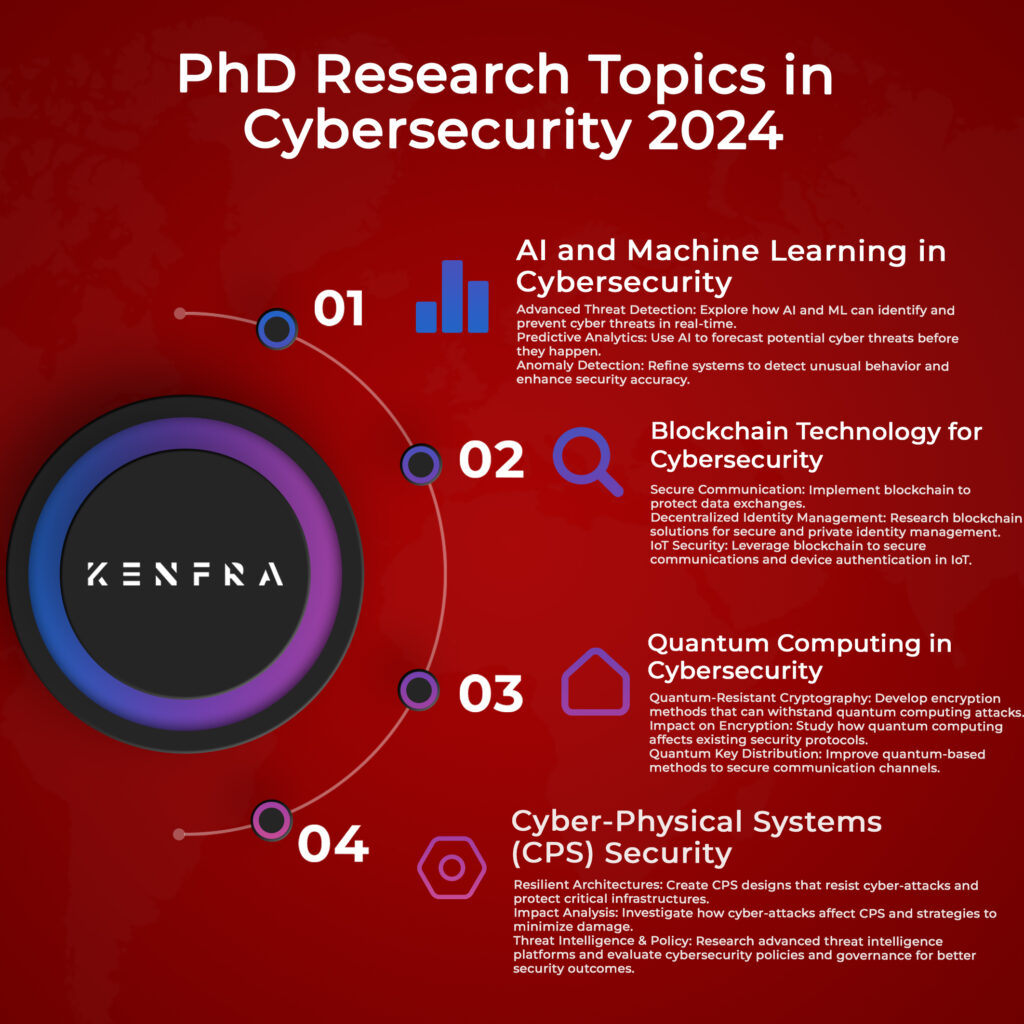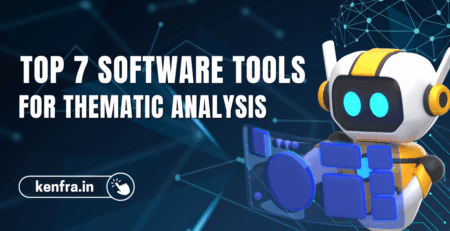PhD research topics in cybersecurity for 2024
Kenfra2024-08-30T17:55:27+05:30PhD Research Topics in Cybersecurity 2024:
As the digital landscape continues to evolve at a breakneck pace, the field of PhD Research Topics in Cybersecurity 2024 remains at the forefront of technological innovation and research. For those pursuing a PhD in cybersecurity, choosing a research topic that addresses current and future challenges is crucial. In 2024, the realm of cybersecurity is ripe with emerging trends and groundbreaking technologies, making it an exciting time for researchers. This comprehensive guide explores some of the most compelling PhD research topics in cybersecurity, providing valuable insights into each area and how you can contribute to this dynamic field.
Artificial Intelligence and Machine Learning in Cybersecurity
Artificial Intelligence (AI) and Machine Learning (ML) have become pivotal in enhancing PhD Research Topics in Cybersecurity 2024 measures. Research in this domain can lead to groundbreaking advancements in threat detection and response.
1.1 Advanced Threat Detection Algorithms
AI and ML are increasingly used to develop advanced algorithms for real-time threat detection. Researchers are focusing on:
- Developing ML models that can identify anomalous behavior and potential threats more accurately.
- Improving real-time threat analysis by leveraging AI-driven analytics to predict and counteract cyber attacks before they occur.
1.2 Predictive Analytics for Cyber Threats
Predictive analytics, powered by AI, allows organizations to anticipate and mitigate potential cyber threats. Key areas of research include:
- Creating predictive models that use historical data to forecast future cyber threats.
- Integrating AI with existing security frameworks to enhance their predictive capabilities.
1.3 Enhancing Anomaly Detection Systems
Anomaly detection is crucial for identifying potential security breaches. Research topics in this area involve:
- Refining algorithms to reduce false positives and improve detection accuracy.
- Exploring AI-driven approaches to dynamically adjust detection parameters based on evolving threat landscapes.
Blockchain Technology for Cybersecurity
Blockchain technology is transforming various sectors, including PhD Research Topics in Cybersecurity 2024. Its decentralized nature offers robust security features that can be leveraged for several innovative solutions.
2.1 Blockchain-Based Secure Communication
One significant research area is the development of blockchain-based communication protocols that ensure secure data exchanges. This includes:
- Designing secure messaging systems using blockchain to prevent unauthorized access and data tampering.
- Implementing decentralized communication platforms to enhance security and privacy.
2.2 Decentralized Identity Management
Blockchain offers a promising solution for identity management by providing a secure and decentralized framework. Key research directions include:
- Developing decentralized identity systems that reduce reliance on centralized authorities.
- Exploring methods to enhance user privacy and control over personal information.
2.3 Securing IoT Devices with Blockchain
The Internet of Things (IoT) is rapidly expanding, and securing IoT devices is a significant concern. Research in this area focuses on:
- Implementing blockchain protocols to secure communications between IoT devices.
- Developing blockchain-based systems for device authentication and authorization.
Quantum Computing and Cybersecurity
Quantum computing presents both opportunities and challenges for cybersecurity. Research in this area aims to address the implications of quantum technology on current security measures.
3.1 Quantum-Resistant Cryptographic Algorithms
As quantum computing advances, traditional cryptographic algorithms may become obsolete. Research topics include:
- Developing quantum-resistant encryption methods that can withstand attacks from quantum computers.
- Evaluating the effectiveness of existing quantum cryptography techniques in securing data.
3.2 Impact on Existing Encryption Methods
Quantum computing has the potential to disrupt current encryption standards. Key research areas are:
- Assessing the vulnerabilities of classical encryption methods to quantum attacks.
- Exploring hybrid cryptographic approaches that combine quantum and classical techniques.
3.3 Quantum Key Distribution
Quantum key distribution (QKD) offers a new way to secure communications. Research focuses on:
- Improving QKD protocols to enhance their practicality and scalability.
- Investigating the integration of QKD into existing security infrastructures.
IoT Security
The proliferation of IoT devices has introduced new security challenges that require innovative solutions.
4.1 Developing Robust IoT Security Frameworks
Creating comprehensive security frameworks for IoT devices is essential for safeguarding against cyber threats. Research topics include:
- Designing security protocols tailored for diverse IoT environments.
- Implementing measures to address the unique vulnerabilities of IoT devices.
4.2 Securing Smart Home Devices
Smart home devices are particularly vulnerable to cyber attacks. Key research directions include:
- Enhancing security measures for commonly used smart home devices.
- Developing methods to secure communication between smart home devices and users.
4.3 Secure Communication Protocols for IoT Networks
Effective communication protocols are vital for IoT security. Research in this area includes:
- Creating secure communication standards for IoT networks.
- Exploring techniques to protect data transmission in IoT environments.
Cyber-Physical Systems (CPS) Security
Cyber-Physical Systems integrate computing with physical processes, making them susceptible to cyber attacks. Research focuses on:
5.1 Resilient CPS Architectures
Developing resilient architectures for CPS is crucial for ensuring their security. Key research areas include:
- Designing architectures that can withstand cyber attacks and minimize their impact.
- Implementing robust security measures for critical infrastructure systems.
5.2 Securing Critical Infrastructure
Critical infrastructure systems, such as power grids and transportation networks, require enhanced security. Research topics include:
- Developing security protocols for critical infrastructure components.
- Assessing vulnerabilities and implementing countermeasures to protect against attacks.
5.3 Analyzing the Impact of Cyber Attacks
Understanding the effects of cyber attacks on physical systems is essential. Research focuses on:
- Evaluating the consequences of attacks on CPS functionality and safety.
- Developing strategies to mitigate the impact of cyber attacks on physical processes.
Cyber Threat Intelligence
Effective cyber threat intelligence helps organizations anticipate and respond to cyber threats. Research in this area includes:
6.1 Advanced Threat Intelligence Platforms
Developing advanced platforms for threat intelligence is crucial for improving cybersecurity. Key research directions include:
- Creating platforms that integrate data from various sources for comprehensive threat analysis.
- Enhancing real-time threat detection through advanced analytics and machine learning.
6.2 Sharing Threat Intelligence
Sharing threat intelligence across organizations can improve overall security. Research topics include:
- Developing frameworks for secure and efficient threat intelligence sharing.
- Exploring techniques to standardize threat intelligence data for interoperability.
6.3 Automated Threat Analysis Methods
Automating threat analysis can improve response times and accuracy. Research focuses on:
- Developing automated tools for analyzing and responding to cyber threats.
- Integrating AI and ML into threat analysis processes to enhance efficiency.
Privacy-Preserving Technologies
Protecting user data privacy is a major concern in cybersecurity. Research in this area aims to develop technologies that safeguard personal information.
7.1 Privacy-Preserving Data Mining
- Data mining techniques that preserve user privacy are essential. Research topics include:
- Developing algorithms that anonymize data while maintaining its utility.
- Exploring methods to secure data mining processes against unauthorized access.
7.2 Secure Multiparty Computation
Secure multiparty computation allows multiple parties to perform computations without revealing their inputs. Key research directions include:
- Improving efficiency and scalability of secure multiparty computation techniques.
- Exploring applications in various domains, such as finance and healthcare.
7.3 Differential Privacy
Differential privacy provides a framework for protecting individual data. Research includes:
- Enhancing differential privacy techniques to improve their effectiveness.
- Investigating the applicability of differential privacy in different data environments.
Human Factors in Cybersecurity
Human behavior significantly impacts cybersecurity. Research in this area focuses on understanding and addressing these factors.
8.1 Social Engineering Attacks
Social engineering attacks exploit human psychology. Key research topics include:
- Analyzing the effectiveness of different social engineering techniques.
- Developing countermeasures to prevent and mitigate social engineering attacks.
8.2 Cybersecurity Training Programs
Effective training programs can improve user awareness and behavior. Research areas include:
- Designing training modules that address common cybersecurity threats.
- Evaluating the impact of training on user behavior and security practices.
8.3 User Behavior and Cyber Attack Success
Understanding the role of user behavior in cyber attack success is crucial. Research focuses on:
- Investigating behavioral patterns that contribute to security breaches.
- Developing strategies to influence positive security behavior among users.
Cybersecurity Policy and Governance
Effective policies and governance frameworks are essential for enhancing cybersecurity. Research topics in this area include:
9.1 Evaluating Cybersecurity Policies
Assessing the effectiveness of current cybersecurity policies can identify areas for improvement. Key research areas include:
- Analyzing policy effectiveness in mitigating cyber threats.
- Exploring the impact of policy changes on organizational security.
9.2 International Cybersecurity Cooperation
International cooperation is vital for addressing global cybersecurity challenges. Research includes:
- Developing frameworks for international cybersecurity collaboration.
- Assessing the effectiveness of existing international agreements and initiatives.
9.3 Government Regulations and Cybersecurity
Government regulations play a significant role in cybersecurity. Research topics include:
- Investigating the impact of regulations on organizational security practices.
- Exploring regulatory approaches to enhance cybersecurity resilience.
Security in Emerging Technologies
Emerging technologies present new security challenges and opportunities. Research in this area focuses on:
10.1 Security Protocols for 5G Networks
5G technology introduces new security considerations. Key research areas include:
- Developing security protocols specifically designed for 5G networks.
- Assessing vulnerabilities and implementing mitigation strategies.
10.2 Securing Autonomous Vehicles
Autonomous vehicles require robust security measures. Research topics include:
- Designing security frameworks for autonomous vehicle systems.
- Investigating vulnerabilities and developing solutions to protect against attacks.
10.3 Privacy and Security in Augmented Reality
Augmented reality (AR) introduces unique privacy and security challenges. Research focuses on:
- Developing security measures to protect AR applications and user data.
- Exploring privacy implications of AR technologies and proposing solutions.
Selecting the Right Research Topic
Choosing the right PhD research topic in cybersecurity is a critical step toward a successful academic career. At Kenfra Research, we offer expert guidance to help you select and refine your research topic, ensuring it aligns with current trends and your academic goals. Contact Kenfra Research for personalized support and resources tailored to your research needs.











Leave a Reply